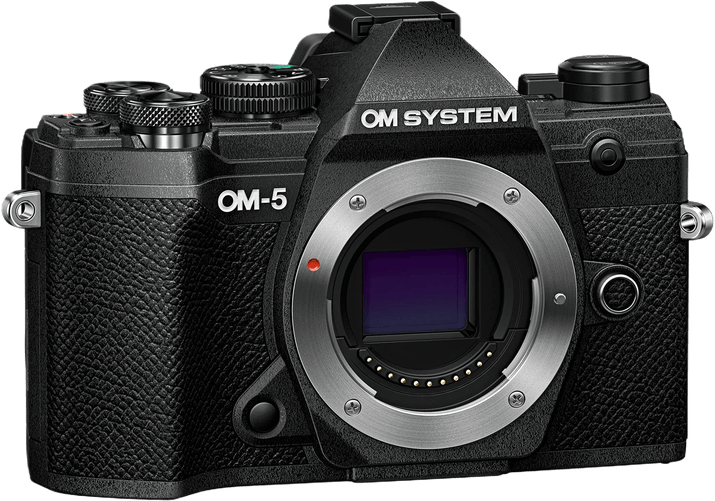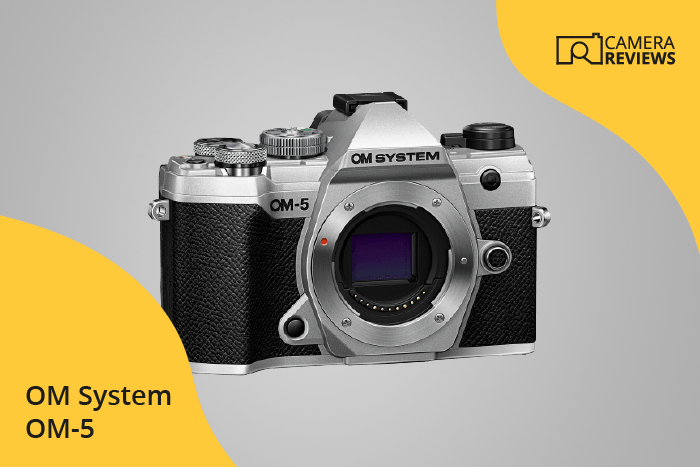Olympus OM System OM-5 Specs and Scores

The Olympus OM System OM-5 scores a solid 70 out of 100. This mirrorless camera, announced on October 26, 2022, and released the same year, is priced at $1199. With dimensions of 125 x 85 x 50mm and a weight of 414g (0.91lbs), the OM-5 offers a compact and lightweight option for photographers.
Considering the specifications, the OM-5 holds its own in today’s competitive camera market. Its size and weight make it a convenient choice for those on the go. The score of 70 reflects its capabilities as a reliable camera option for various photography needs.
Olympus OM System OM-5 Overview and Optics
The Olympus OM System OM-5 received a score of 68/100 for its optics. With 20 megapixels and a shooting speed of 30 frames per second, it offers decent performance in terms of resolution and speed. The camera utilizes a CMOS sensor and is powered by the TruePic IX processor, contributing to its DXOMARK sensor score of 80.
The OM-5 features a Micro Four Thirds sensor size and is compatible with Micro 4/3 lens mounts. This camera also provides image stabilization and has a 4:3 aspect ratio. Considering the specifications, the Olympus OM System OM-5 holds its ground in today’s market, especially for those seeking a compact and versatile camera.
While the optics score of 68 may not place the OM-5 at the top of its class, the camera still offers a solid choice for photographers who value a balance of performance and portability.
Olympus OM System OM-5 Video Performance
The Olympus OM System OM-5 boasts a video score of 91 out of 100. This high score reflects the camera’s impressive video capabilities. The OM-5 offers a maximum video resolution of 4K, with dimensions reaching 4096 x 2160. This resolution ensures sharp and detailed footage, meeting the standards of today’s market.
Additionally, the OM-5 supports a maximum video frame rate of 120fps, allowing users to capture smooth slow-motion shots. This feature enhances the camera’s versatility and appeals to videographers seeking flexibility in their shooting options. Furthermore, the OM-5 has a built-in time-lapse functionality, providing photographers with the tools to create captivating time-lapse sequences.
The Olympus OM System OM-5’s video capabilities stand strong in the current market, offering users high-quality footage and a range of features. The 91/100 video score reflects the camera’s impressive performance and versatility in video recording.
Olympus OM System OM-5 Features and Benefits
The Olympus OM System OM-5 boasts a feature score of 83/100, offering a range of capabilities that cater to the modern photographer’s needs. Among its features, the OM-5 has a 3-inch touchscreen with a resolution of 1,040,000 dots, allowing for easy navigation and clear image preview. The camera also includes a flip screen, providing versatility for various shooting angles and compositions.
Additionally, the OM-5 is equipped with convenient wireless connectivity options, such as Wi-Fi and Bluetooth, making image sharing and remote control seamless. However, it does not have a built-in GPS, which could be a drawback for some users who require geotagging capabilities.
Taking these specifications into account, the Olympus OM System OM-5 holds its own in today’s competitive camera market with a solid feature set that meets the demands of modern photographers.
Olympus OM System OM-5 Storage and Battery
The Olympus OM System OM-5 receives a storage and battery score of 35/100. It has a single memory card slot that accepts SD, SDHC, and SDXC cards, including UHS-II compatibility. This storage capacity is adequate for casual photographers, but professionals may find it limiting compared to cameras with dual card slots.
The OM-5’s battery life is relatively short, providing only 310 shots per charge. Its use of the BLS-50 battery type and USB charging capability, however, make it convenient for on-the-go users who need to recharge quickly. Despite these features, the OM-5’s storage and battery specifications fall short when compared to newer camera models on the market.
Olympus OM System OM-5 Alternatives
Do you want to know how the Olympus OM System OM-5 compares to its competitors? Have a look at the most popular comparisons for this camera below:
- Fujifilm X-T5 vs Olympus OM System OM-5
- Olympus OM-D E-M5 Mark III vs OM System OM-5
- Canon EOS R7 vs Olympus OM System OM-5
- Fujifilm X-T3 vs Olympus OM System OM-5
- Nikon D5000 vs Olympus OM System OM-5
- Nikon D7500 vs Olympus OM System OM-5
Olympus OM System OM-5 FAQ
Does the Olympus OM System OM-5 Have Built-in Image Stabilization?
Yes, the Olympus OM System OM-5 features built-in 5-axis image stabilization, providing excellent stability for both still photography and video recording.
Does the Olympus OM System OM-5 Support 4K Video Recording?
Yes, the Olympus OM System OM-5 supports 4K video recording at 30 frames per second, enabling high-quality video capture for various situations.
What Size Sensor Does The Olympus OM System OM-5 Have?
The Olympus OM System OM-5 is equipped with a Micro Four Thirds sensor, offering a balance between compact size and image quality for versatile shooting.
Does the Olympus OM System OM-5 Have a Dual Memory Card Slot?
No, the Olympus OM System OM-5 has a single SD card slot, which supports UHS-II SD cards for faster read and write speeds.
Does the Olympus OM System OM-5 Have a Touch Screen?
Yes, the Olympus OM System OM-5 features a touch screen LCD, allowing for easy navigation and control of camera settings.
Does the Olympus OM System OM-5 Have Wi-Fi and Bluetooth?
Yes, the Olympus OM System OM-5 has both Wi-Fi and Bluetooth connectivity, enabling seamless sharing of photos and remote camera control via compatible devices.
Does the Olympus OM System OM-5 Have GPS?
No, the Olympus OM System OM-5 does not have built-in GPS, but you can use the Wi-Fi or Bluetooth connection to sync location data from a compatible smartphone.
Is the Olympus OM System OM-5 Weather Sealed?
Yes, the Olympus OM System OM-5 features weather sealing, making it resistant to dust, moisture, and freezing temperatures for reliable performance in various conditions.
Does the Olympus OM System OM-5 Have a Built-in Flash?
No, the Olympus OM System OM-5 does not have a built-in flash, but it does have a hot shoe for attaching an external flash if needed.

